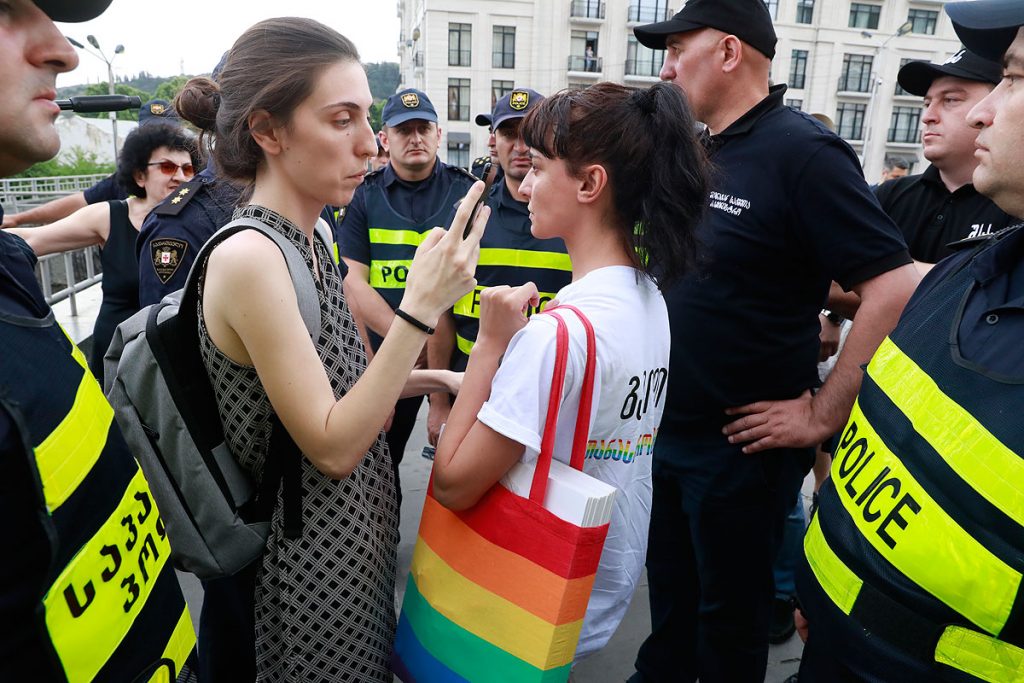A new study, presented by Media Development Foundation, a local watchdog, said that in 2019 homophobic hate speech statements have drastically increased in Georgia, while remarks involving xenophobia, racism and religious discrimination observed decline.
The study, focusing on five forms of hate speech – homophobia, xenophobia, religious discrimination, hate speech with different motives, and racism – monitored discriminatory statements made by media, political parties, civil society organizations, clerics and representatives of society.
According to the research, in 2019, a total of 1918 discriminatory statements have been recorded, most of them being homophobic (63.3%), while xenophobic comments came second with 28.1%.
Queers as Scapegoats in Georgia
In general, compared to 2018, the amount of homophobic statements has increased drastically (2019-1214; 2018 – 732), whereas xenophobic (2019 – 538; 2018 – 802), discriminatory in religious sense (2019 – 76; 2018 – 154), and racist (2019 – 6; 2018 – 54) commentaries have declined.
MDF noted that “homosexuals are against God”; “anti-discrimination law equalizes homosexuals with other groups”; “homosexuals are diseased and their freedom of expression should be restricted”; “gay pride is a provocation”; “gay movies (And Then We Danced, Comets) are propaganda of depravity”; “the West imposes homosexuality upon us, while Russia contradicts it” were among the most frequent homophobic messages.
According to the CSO, the majority of homophobic statements alleged that the West is imposing homosexuality on Georgia (275 comments); that homosexuality is a disease and perversion (209); that the freedom of expression of LGBTQ Georgians infringes on the rights of the majority (196), etc.
The watchdog noted that several media outlets and anti-liberal nativist movement of the Georgian March – which now runs for October parliamentary polls – tried to link June 20, 2019, anti-occupation protests to gay pride and the LGBT community. Various actors, MDF said, pushed the opinion that the resignation of then-Interior Minister Giorgi Gakharia (elevated as PM since September) was demanded by supporters of the United National Movement, former ruling party, and “pederasts” (pejorative term to describe homosexuals).
Message Box of Xenophobia
The report also observed that most of the xenophobic messages promote anti-migration discourse (51.5%), while Turkophobic statements come second (25.3%). The messages like “migrants = rise of crime, sexual violence, demographic threats” and “the educational system prepares adolescents for Ottomanization and Arabization” were circulated in the media.
The Turkophobic discourse was especially enhanced by the Alliance of Patriots of Georgia, nativist Kremlin-friendly party, and affiliated to them Obieqtivi TV with the messages that “Turkey is a historic enemy”; “If Russia is an occupier, then Turkey is an occupier as well.”
Furthermore, the xenophobic discourse also included anti-Azerbaijani and Armenophobic messages. The former was mostly connected to the events of David Gareja Monastery, while the latter encompassed the negative references to the Armenian surnames, mostly of politicians and certain public figures.
Although in decline compared to 2018, statements of religious discrimination still prevailed in Georgian media, most of them being Islamophobic (61.9%). The opinions that “Adjara is being Islamized” and “Russia saved Georgia from Islamization” were circulated. As for other examples of religious discrimination, the view that “Only Russia can provide protection from the Jehovah’s Witnesses” proved to be popular.
The number of racist commentaries was the least (6) from hate speech and also decreased compared to 2018. From the racist statements, the discourse that “black people are descendants of a man who was punished by God” dominated.
Sources of Hate Speech
Similar to the previous reporting year, hate speech in media with different motives was mostly deployed by journalists of Sakartvelo da Msoplio (Georgia and the World), Asaval-Dasavali, Obiektivi TV, Sakinformi, Alia and Resonance.
As for political parties, hate speech was most frequently utilized by Alliance of Patriots, followed by Kartuli Dasi of Jondi Baghaturia, Democratic Movement – United Georgia of Kremlin-friendly ex-Speaker Nino Burjanadze, and Georgian Idea.
Overall, the representatives of the ruling Georgian Dream party made 28 discriminatory statements, while the opposition party the United National Movement – 11.
According to the conclusion of the study, most of the discriminatory statements from politicians, clerics, and members of society were homophobic. At moments, for example, about the broadcasting of “gay movies” the opinions of the ruling party Georgian Dream and opposition UNM concurred.
The report also recorded discriminatory statements from civil society organizations. According to the results, eight civil society organizations were particularly active with the use of hate speech, including Georgian March and Children’s Rights Protection Society, Union of Human Rights Defenders, Primakov Georgian-Russian Foundation, The Georgian Mission, Sakhalkho Kreba (People’s Assembly) and Eurasian Institute.
This post is also available in: ქართული (Georgian) Русский (Russian)

